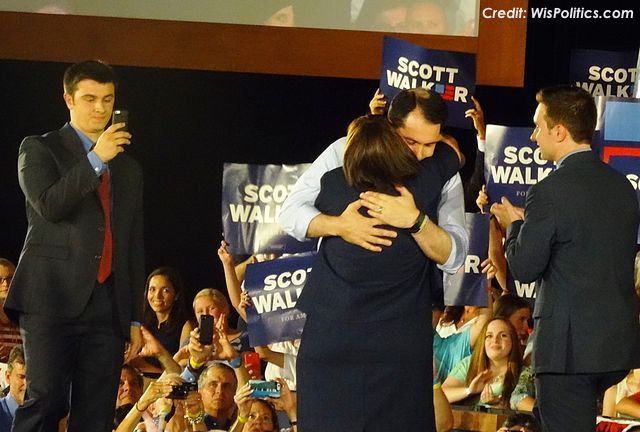In a weird way, it shows how much progress feminism has made that misogynists now need to claim women secretly want to be oppressed.
Tag Archives: women
What is the debate about Planned Parenthood really about?
Hint: it’s certainly not about science.

Since the release of five highly doctored videos of Planned Parenthood executives appearing to sell fetuses, much has been said about Planned Parenthood and the women who use their services. However, few people appear to have asked “Who was buying fetal tissue and why?” Little attention has been paid to the importance of research on fetal tissue and the typically bipartisan support that this research receives. (Even Senator Mitch McConnell, now spearheading the effort to defund Planned Parenthood, voted to support the donation of fetal tissue from abortions in 1993.)
On July 29, 2015, Planned Parenthood President Cecile Richards sent a much-ignored letter to the director of the National Institute of Health. She wrote:
“It has become clear in the ensuing public debate … that there is widespread confusion about fetal tissue research and that government officials, medical researchers, health care providers, and the public could benefit from a review of the research and the procedures surrounding it by an independent expert panel. The last time such a review occurred was in 1988 during the Reagan Administration. We believe it may be time for another expert panel to examine these issues in light of the advancements achieved in medicine over the past 27 years.”
The 1988 panel to which Richards refers was overseen by a conservative judge opposed to abortion. Nonetheless, “a decisive majority of the panel found that it was acceptable public policy to support transplant research with fetal tissue.” The panel even concluded that aborted fetuses were acceptable donations to the medical community, so long as the decision to abort a fetus and decisions regarding the time or method of abortion were not interfered with in order to collect the tissue.
Fetal tissue is no longer a central focus of transplant research, but remains important for many other kinds of medical discovery, including the study of birth defects, genetic causes of diseases, and even possible cures for degenerative disease, such as Parkinson’s Disease. Researchers at MIT are even able to use fetal tissue to implant the human immune system into mice, allowing them to study tumors and human responses without using human test subjects.
Fetal tissue has a long history of being incredibly valuable in the medical field, most notably in the development of vaccines. In the mid-1960’s, an aborted fetus allowed researchers to isolate the Rubella virus and develop the vaccine for the deadly disease which is still used today. The researcher central to this discovery, Stanley Plotkin, spoke out:
“Human fetal cell strains, derived from voluntary abortions, have been extremely important for vaccine development, specifically for rabies, rubella, hepatitis A, and chicken pox. It is important to understand that the cell [lines] are stored and no new abortions are done to produce those vaccines.”
(The last line is presumably meant to clarify that the fetal cells are used only in the research and development phase, not the actual manufacture of the developed vaccines. –Ed.)
Richards’ letter to the NIH explains the limited, but important role that Planned Parenthood plays in fetal tissue donation. Planned Parenthood exists in all 50 states, but currently, in only five states are women able to donate tissue through Planned Parenthood. She writes:
“We participate in fetal tissue donation and occasionally partner in research not because this research is a core part of our mission, but because we are supporters of medical research and serve women who chose to make donations.”
In an editorial published in the New England Journal of Medicine, the influential journal threw their full support behind Planned Parenthood and their work:
“We strongly support Planned Parenthood not only for its efforts to channel fetal tissue into important medical research but also for its other work as one of the country’s largest providers of health care for women, especially poor women. The contraception services that Planned Parenthood delivers may be the single greatest effort to prevent the unwanted pregnancies that result in abortions…We thank the women who made the choice to help improve the human condition through their tissue donation; we applaud the people who make this work possible and those who use these materials to advance human health.”
An opinion piece in the Washington Post this week brought into light the similarities between the policies of Planned Parenthood and the donations of fertilized embryos by in vitro fertilization (IVF) clinics. The author, Margo Kaplan, an associate professor at Rutgers Law School, believes that one of the biggest differences between perceptions of the two donations is which women are making the donation.
Women who donate through the IVF clinic are women who want to become mothers and have waited a long time to get the treatment. (Oh, and they are typically white and wealthy.) Those women who decide to end a pregnancy at a Planned Parenthood clinic are admonished by society for their “irresponsible lifestyles” and unwillingness to become mothers at the moment.
It seems to me that if the outrage that has continued to smolder since the public viewing of these doctored videos was truly over the use sale of fertilized embryos and the use of fetal tissue in research, people would be talking about those things. (GOP Presidential candidate Dr. Ben Carson himself used fetal tissue in research, but claims that since the specimen was already dead when he used it, he is in no way in the wrong.) Instead, once again, it appears that the target of the public’s thinly-veiled outcry is actually the women who use the services of Planned Parenthood.
AFD Micron #13
AFD Micron #10
No, You Cannot Have an Afro
A few months ago, the #TwitpicYourCheveuxCrepus hashtag went viral in both France and the US. It was a reaction to the French magazine Public saying Solange Knowles’ hair resembled armpit hair. Those tweeting in response instead decided to showcase the many different and beautiful styles Black hair has to offer.
Last week, on the opposite end of the spectrum from hatred of afros, Allure magazine decided to publish a tutorial on how to get the “afro” look with straight hair under the title “You (Yes, You) Can Have an Afro, Even If You Have Straight Hair” complete with a picture of a smiling White woman with her hair in tight afro-like curls.
I’m going to just go ahead and refute this right now and tell you that no, you most certainly cannot have an afro if you have straight hair.
Many will try and argue that an afro is just a hairstyle, and therefore should be something that anyone can wear. Those people are wrong. They fail to understand that afros in all of their various curl patterns are literally the natural way that hair physically grows on the heads of African-descended people.

Angela Davis (left) and another woman, both with large afros, in 1969 at UCLA. (Photo Credit: George Louis via Wikimedia)
And for well over two hundred years, it has often been considered taboo for Black people to show their hair in its natural state in public.
In Louisiana, in the late 1700s, tignon laws were established that required Black women to cover their hair. The idea of Black and mixed race women of African Ancestry having pride in their natural appearance was such a threat to Louisiana society because it gave the appearance that Black people could be of a higher stature than was permitted for them at the time. It was also believed that the hairstyles were luring White men into interracial relationships, and could potentially strengthen Black influence in New Orleans. The tignon laws were put in place to stop that influence and to essentially keep Black people relegated to a lower class.
That may seem extreme or an archaic example, but even today natural Black hair is considered inappropriate for everyday situations. In 2013, Tiana Parker was sent home from her school in Oklahoma because her dreadlocks were not considered a “presentable hairstyle.” The school even went so far as to say that dreadlocks, afros and braids were considered “faddish hairstyles” and therefore not allowed. Again in 2013, a school in Ohio tried to ban afro-puffs and twisted braids, which for Black girls is as standard a hairstyle as pigtails are for people with naturally straight hair.
In a recent article in The Atlantic, the idea of a “makeup tax” was explored. The author talks about how women in general spend a lot of money and time on makeup and beauty products in order to be considered presentable to a male-dominated workplace. If the makeup tax is this much of a financial commitment for White women, imagine then what it must be like for Black women having to spend money not just on makeup but altering their hair in order for it to be considered neat and clean by White standards. Clearly Black women’s money has a significant effect on the haircare industry, since the natural hair push has caused many companies to create products for Black hair and even buy up businesses like Shea Moisture to cover that part of the market.
You cannot erase this context to make an Afro “just a hairstyle” (full story➚). The fact that our hair is considered either “unpresentable” or a fad clearly shows the disconnect that many people have with Black hair. It is especially insulting that with the amount of work and money that Black women have had to sacrifice over the years in order for our hair to be considered “presentable,” White women especially have recently been latching onto our hairstyles and are called innovative for doing so.
Our hair is not a fad, it is the natural way our hair grows on our heads, and we have the right to say no when people try to appropriate it.
Policing Black Women’s Emotions and Opinions
The bigger picture framing Nicki Minaj’s frustrated tweets about the VMAs.

Nicki Minaj at the 2010 VMAs. (Photo Credit: Philip Nelson / flickr)
I’ve said before that there is an unwritten code of conduct that Black women must adhere to in order to be taken seriously, listened to, or even allowed to live.
Most other people will quickly claim it’s the attitudes of Black women that causes us to be dehumanized, but that is untrue. Even when we’re being polite, any disagreement from Black women is treated as aggression. So where and when are we allowed to speak up if we’re being mistreated, when everything we say is considered an attack?
On Tuesday, rapper Nicki Minaj took to Twitter to vent about the VMA nominations. Nicki is by far the most popular female rapper out there right now. She has found major pop success as well. But she has always been very vocal about how Black women in the music industry often don’t get the recognition they deserve for their work.
If I was a different "kind" of artist, Anaconda would be nominated for best choreo and vid of the year as well. ???
— NICKI MINAJ (@NICKIMINAJ) July 21, 2015
She’s no stranger to the way the public sees her (and other Black women) either, so in her tweets on Tuesday, Nicki Minaj states plainly her disappointment at her record breaking video for Anaconda being snubbed for Video of the Year. Nicki points out that although her video was a viral success, broke Vevo records, and was even parodied on the Ellen DeGeneres show, her video did not receive a nomination. She also points out that her video was a celebration of women’s bodies, but it seemed that this type of celebration was only acceptable on thinner artists.
Then this happened.
@NICKIMINAJ I've done nothing but love & support you. It's unlike you to pit women against each other. Maybe one of the men took your slot..
— Taylor Swift (@taylorswift13) July 21, 2015
Within the hour, articles popped up all over the internet about a “feud” between the two women, stating that Nicki Minaj had attacked Taylor in her tweets, even though Taylor Swift’s name wasn’t mentioned once, nor had Nicki been malicious towards other artists.
Nicki, in her own words, was pointing out where she saw how misogyny played a part in who was considered worthy of accolades and who was looked over. She was pointing out a complex problem in the most direct way possible. But it seemed that the media wanted to skip over her entire point and instead focus on a non-existent feud between the her and Taylor Swift.
Taylor Swift’s tweets did more than just derail a real and important point that Nicki Minaj was trying to make. Aside from being the most obvious case of a hit dog hollering, Taylor’s tweet demonstrated a huge issue that mainstream White Feminism has when it comes to dealing with Black women and other People of Color.
They don’t get that our experiences are different from theirs and often try an chastise us for perceived slights against them, while ignoring the real ones we face. Although Nicki Minaj’s tweets are a criticism of the VMAs, Taylor tries to make it seem as if Nicki is “pit[ting] women against women” for simply speaking about her experience as a thick and Black woman in the music industry.
Instead of understanding that Nicki’s experience as a woman is different from what her own might be, Taylor instead falls back to a very narrow — and White — view of what life is like as a woman.
Read more
Scott Walker: Abortion is between you, your doctor, and me

Scott Walker and family at his 2016 presidential campaign announcement. (Credit: WisPolitics.com / Flickr)
Flippy-floppy Scott Walker just signed a 20-weeks abortion ban bill in Wisconsin. One the one hand, it’s fully consistent with his overall views:
Walker’s record includes defunding Planned Parenthood, requiring abortion doctors to have admitting privileges at nearby hospitals, a law currently blocked by a federal court judge, and requiring women to have ultrasounds and be shown images of the fetus before having an abortion.
On the other hand, he refused to give a position during the 2014 campaign on the type of ban he just signed and even went as far as to put out a very misleading ad:
Just nine months ago he ran a television ad during his gubernatorial re-election campaign where he said whether to obtain an abortion is an agonizing decision between a woman and her doctor.
Apparently, he meant to say, it’s a “decision between a woman and her doctor” and her state legislature and her governor / native-son presidential candidate.
But he’s the leading choice of “conservative” Republican voters, so, guess he’s gotta do what he’s gotta do, and really get himself right up in there.



